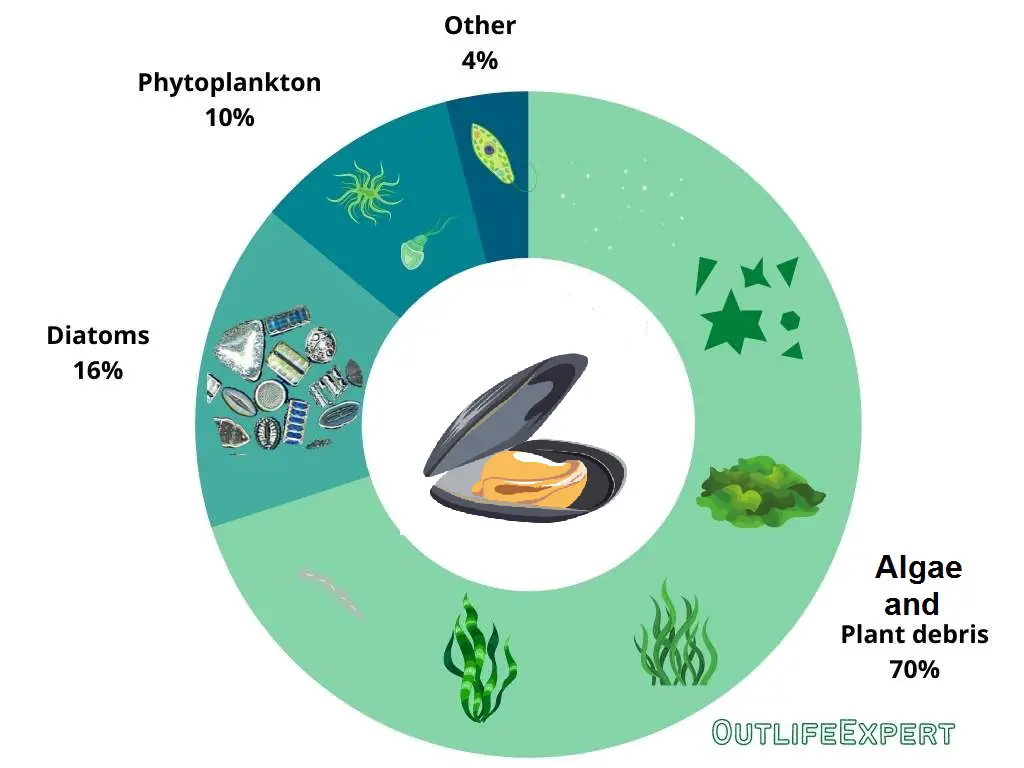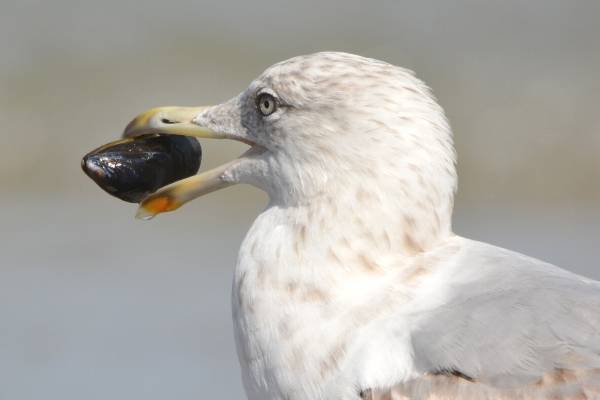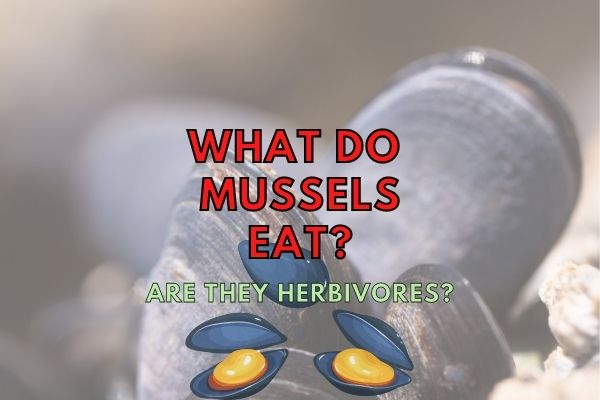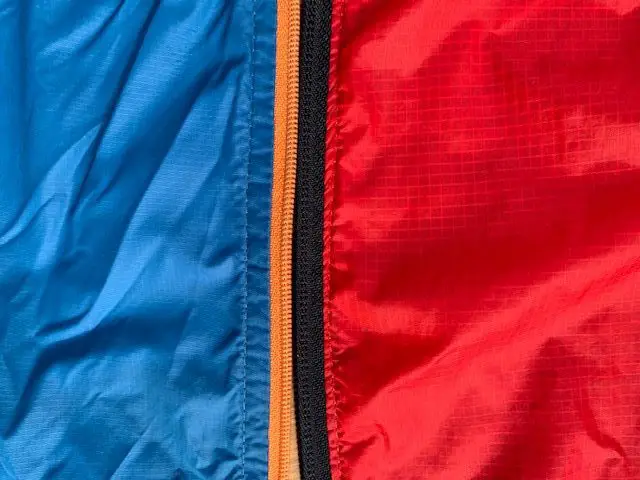Mussels are common freshwater and marine bivalves. They are filter feeders that strain large volumes of water to extract small prey such as algae, bacteria and plankton. In this way, they play an important role in water purification.
Mussels are mostly herbivores, but they are known to be opportunistic feeders that will consume other food items if available. Their diet consists mainly of algae, but they also eat small amounts of bacteria, zooplankton, detritus and other organic matter.
As filter feeders, mussels play an important role in the aquatic food web by removing large amounts of plankton and bacteria from the water column. This helps to control the growth of algae populations and keeps waters clean.
Habitat and Primary Diet of Mussels
Mussels live in rocky areas on the seashore. They are found in oceans, seas, bays, and lakes.
There are many different types of mussels, but they can broadly be classified into two groups: freshwater mussels and marine mussels.
Freshwater mussels are found in rivers, lakes, and other freshwater habitats, while marine mussels are found in saltwater habitats.
All types of mussels are filter feeders, meaning that they filter water through their bodies to capture small particles of food. These particles can include algae, bacteria, detritus (organic matter), and small invertebrates.
Mussels primarily eat algae and plankton, which are tiny plants and animals drifting in water. Mussels filter their food from the water using their filtering gills.
Some of the most common food items eaten by mussels are:
- Algae
- Bacteria
- Plankton
- Zooplankton
The exact composition depends on the habitat.

How do Mussels Eat?
Mussels use their strong muscular foot to clamp onto rocks. Mussels have two shells, and when food is captured, it is passed from the larger shell to the smaller shell where digestion takes place. Mussels release their waste outside the shell, and that waste is eaten by other organisms.
How much do mussels eat?
To calculate this, we need to have a few numbers in place.
Let’s take two examples – a large and a smaller mussel.
Where small freshwater mussels (max 2″ long) will filter through approximately 4 gallons of water per day, larger oysters will filter trough 50 gallons. While strictly speaking not clams, oysters have been well studied so I will include the information known for oysters to compare.
The amount of solids in seawater is quite little and depends of course on the location, depths, temperature, etc.
However, as a starting point a study on the organic content of seawater estimates an organic particle content of around 100 grams per cubic metre, most of which is estimated to consist of the organic particles and plankton that clams eat.
That is, around 100g “mussel food” per 264 gallons (1000L/3.78) of seawater.
So a smaller mussel of around 1.5 inches in size filtering 4 gallons per day would be able to extract maximally (4/264)*100 = 1.5 grams (0.003 lbs) food from those 4 gallons of seawater.
In comparison, a larger oyster would be able to eat maximally (50/264)*100 = 19 grams (0.04 lbs) of organic matter from seawater in a day.
It should be noted that even the most efficient of filter feeders rarely utilize more than 80% of the digestible matter in the water, so these numbers are likely in the optimistic end, but hopefully you get the idea!
This filtering of the water might be slow, but with time it can really make a difference as shown in the video below:
Are Mussels Carnivores, Herbivores or Omnivores?
Mussels are herbivores because they only eat plants and algae. One can also argue that some mussels are omnivores because they also eat zooplankton that essentially consist of small animals.
Are Mussels Producers, Consumers or Decomposers?
Mussels are consumers because they eat other living organisms. Mussels are herbivores, which means that they eat plants and algae. Only plants as well as some bacteria and protozoa are producers.
What Type of Consumer is a Mussel?
Mussels are primary consumers because, like all other herbivores, they only eat plants. Generally, herbivores are primary consumers, omnivores secondary consumers and carnivores are tertiary consumers.
Are Mussels Decomposers?
No. Mussels do not eat dead or decaying matter and are therefore not decomposers. However, they do filter out dead organic matter from the water, which means that they are helping the decomposition of organic matter.
The bacteria in the gut of the mussel plays a very important role for their digestion and these microorganisms may be considered true decomposers.
Where are Mussels in the Food Chain?
Mussels are the first trophic level in the energy pyramid because they are primary consumers. They eat plants, algae, bacteria and some amounts of microscopic crustaceans (zooplankton) which places them at the 2nd and 3rd trophic levels.
Are Mussels Autotrophs or Heterotrophs?
Mussels are heterotrophs because they eat other living organisms. Practically no animals are autotrophic because animals do not get their energy directly from the sun like plants do. That is, animals like mussels cannot make their own energy!
What Animals Prey on Mussels?
Mussels are food for a variety of animals including birds, fish, crabs and starfish.

Conclusion
In this post I have looked into the diet of the mussel and how they feed and how they are important to the food chain!
Mussels are filter feeders and are important in the marine food chain. They are important for the growth of algae, but also for the growth of many other creatures.
A mussel is a herbivore and also a consumers because they eat other organisms. Mussels are important for the growth of many other organisms, and they are also important for the growth of algae!
I you are interested, I wrote a similar article about what clams eat!
Mussel Diet FAQs
Do mussels eat barnacles?
No, but limpets are known to eat barnacles. In fact, they are sometimes considered a nuisance because they can attach themselves to docks, boats, and other structures in large numbers and cause damage. Limpet farmers also have to deal with the problem of mussels eating the barnacles that attach to their cages.
Do mussels eat chitons?
No, there is no evidence that mussels eat chitons. Chitons are a type of mollusk that has a shell composed of eight plates. They are found in marine environments all over the world and usually feed on algae.
Do mussels eat fish?
No, there is no evidence that mussels eat fish. Mussels are filter-feeders and usually only consume small particles like plankton and detritus. However, if a fish happens to get caught in a mussel’s filter-feeding apparatus, the mussel may inadvertently consume some parts of the fish as well.
Do mussels eat poop?
It is possible that mussel eat poop because they are filter-feeders and consume many different types of particles from the water column. However, there is no specific evidence that mussels eat poop from any animals in their natural environment.




